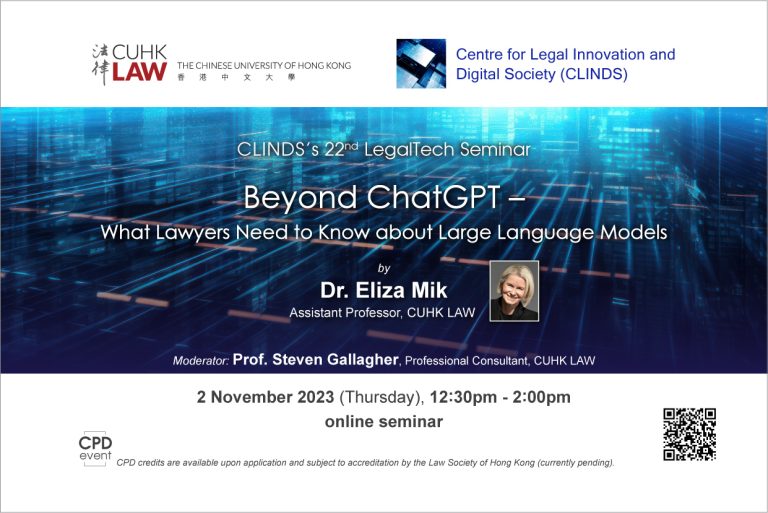活動
CUHK LAW CLINDS’s 22nd LegalTech Seminar – ‘Beyond ChatGPT: What Lawyers Need to Know about Large Language Models’ by Dr. Eliza Mik (Online)
2023年11月2日
12:30 pm – 2:00 pm
Online (Zoom)
Dr. Eliza Mik teaches Legal Technologies, E-Commerce Law and Contract Law at the Faculty of Law, Chinese University of Hong Kong. Her research interests focus on the legal aspects of transaction automation. Before joining academia, she worked in-house for a number of software and telecommunications companies in Australia, Poland, Malaysia and the United Arab Emirates, advising on technology procurement and e-commerce regulation. Eliza has also advised the World Bank and the Monetary Authority of Singapore. At present, she is a member of the UNCITRAL Expert Group for the Digital Economy, a member of the Inclusive Global Legal Innovation Platform on ODR (Hong Kong), a Research Associate at the Tilburg Institute for Law, Society and Technology and an Affiliate Researcher with the Centre for AI and Digital Ethics at the University of Melbourne. She is presently involved in two research projects, one on the feasibility of data-driven approaches in LegalTech and one on the legal responses to smart contracts.
It is widely predicted that the legal profession will be transformed by large language models, or “LLMs.” LLMs owe their name to the large number of parameters in their underlying neural networks and to the vast amounts of data they are trained on. LLMs generate text by predicting the likelihood of a token (character or word) given either its preceding or surrounding context. To date, the most popular LLM-based product is ChatGPT. There is, however, more to know about LLMs than how to use this chatbot. Given the relentless pace of innovation in this area, lawyers must develop a solid understanding of LLMs in general and understand which technological developments may directly affect their daily practice. It is time to look beyond broad statements that “LLMs” will revolutionize legal work. For LLMs to become a useful tool that can be integrated into legal workflows, it is necessary to understand both their capabilities and their limitations as well as the core challenges driving their development. To fully take advantage of the incredible capabilities of LLMs, lawyers must understand such core terms as “fine tuning” or “prompt engineering,” and differentiate between token limits and context windows. Looking beyond ChatGPT, this seminar will explain the basics of LLMs, the core terminology as well as the fundamental technical concepts. More specifically, it will explain how LLMs are created (trained) and how their text generation capabilities can be leveraged, or enhanced, by means of additional techniques. The seminar will also provide an overview of the latest developments in this area, with special emphasis on the variety of LLM-based products that could be useful for legal practice.
The following questions are addressed:
What are LLMs? What are the types of LLMs?
How can lawyers leverage the existing capabilities of LLMs in their legal practice?
Which technical details are directly relevant for lawyers?
What is the relevance of fine-tuning, prompting and retrieval augmented generation?
What are the limitations of LLMs and the risks of deploying them in legal practice?
Language: English
CPD credit is available upon application and subject to accreditation by the Law Society of Hong Kong (currently pending).


